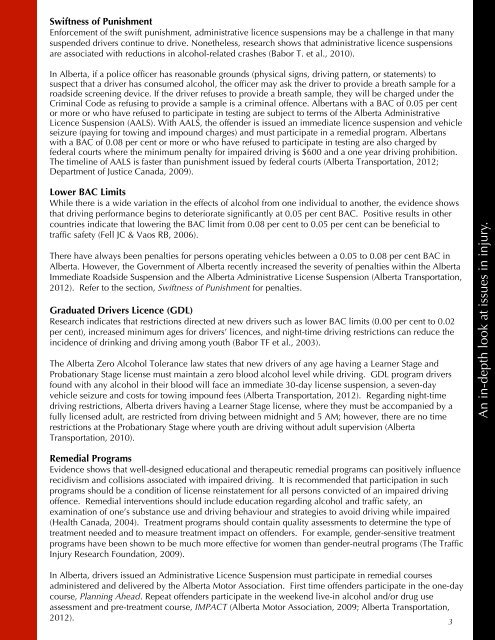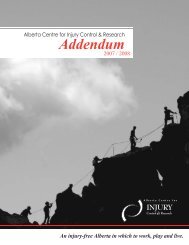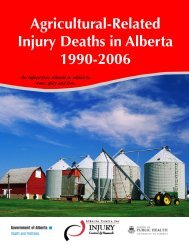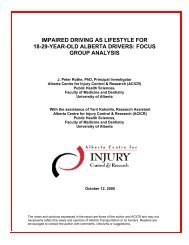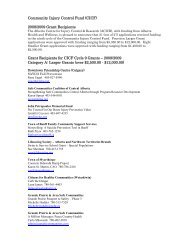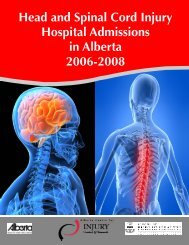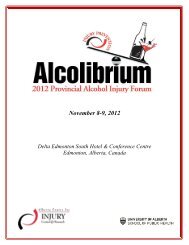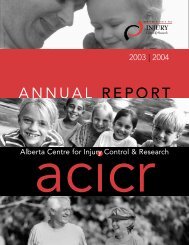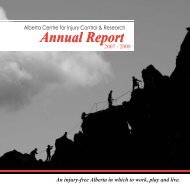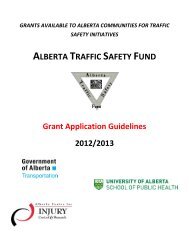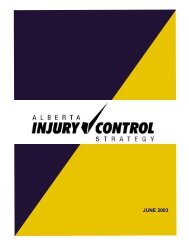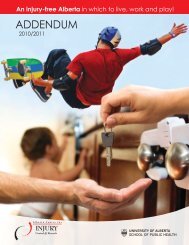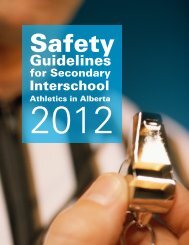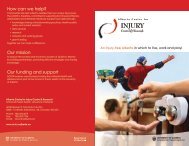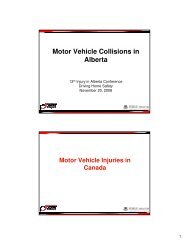Impaired Driving - Alberta Centre for Injury Control & Research
Impaired Driving - Alberta Centre for Injury Control & Research
Impaired Driving - Alberta Centre for Injury Control & Research
You also want an ePaper? Increase the reach of your titles
YUMPU automatically turns print PDFs into web optimized ePapers that Google loves.
Swiftness of Punishment<br />
En<strong>for</strong>cement of the swift punishment, administrative licence suspensions may be a challenge in that many<br />
suspended drivers continue to drive. Nonetheless, research shows that administrative licence suspensions<br />
are associated with reductions in alcohol-related crashes (Babor T. et al., 2010).<br />
In <strong>Alberta</strong>, if a police officer has reasonable grounds (physical signs, driving pattern, or statements) to<br />
suspect that a driver has consumed alcohol, the officer may ask the driver to provide a breath sample <strong>for</strong> a<br />
roadside screening device. If the driver refuses to provide a breath sample, they will be charged under the<br />
Criminal Code as refusing to provide a sample is a criminal offence. <strong>Alberta</strong>ns with a BAC of 0.05 per cent<br />
or more or who have refused to participate in testing are subject to terms of the <strong>Alberta</strong> Administrative<br />
Licence Suspension (AALS). With AALS, the offender is issued an immediate licence suspension and vehicle<br />
seizure (paying <strong>for</strong> towing and impound charges) and must participate in a remedial program. <strong>Alberta</strong>ns<br />
with a BAC of 0.08 per cent or more or who have refused to participate in testing are also charged by<br />
federal courts where the minimum penalty <strong>for</strong> impaired driving is $600 and a one year driving prohibition.<br />
The timeline of AALS is faster than punishment issued by federal courts (<strong>Alberta</strong> Transportation, 2012;<br />
Department of Justice Canada, 2009).<br />
Lower BAC Limits<br />
While there is a wide variation in the effects of alcohol from one individual to another, the evidence shows<br />
that driving per<strong>for</strong>mance begins to deteriorate significantly at 0.05 per cent BAC. Positive results in other<br />
countries indicate that lowering the BAC limit from 0.08 per cent to 0.05 per cent can be beneficial to<br />
traffic safety (Fell JC & Vaos RB, 2006).<br />
There have always been penalties <strong>for</strong> persons operating vehicles between a 0.05 to 0.08 per cent BAC in<br />
<strong>Alberta</strong>. However, the Government of <strong>Alberta</strong> recently increased the severity of penalties within the <strong>Alberta</strong><br />
Immediate Roadside Suspension and the <strong>Alberta</strong> Administrative License Suspension (<strong>Alberta</strong> Transportation,<br />
2012). Refer to the section, Swiftness of Punishment <strong>for</strong> penalties.<br />
Graduated Drivers Licence (GDL)<br />
<strong>Research</strong> indicates that restrictions directed at new drivers such as lower BAC limits (0.00 per cent to 0.02<br />
per cent), increased minimum ages <strong>for</strong> drivers’ licences, and night-time driving restrictions can reduce the<br />
incidence of drinking and driving among youth (Babor TF et al., 2003).<br />
The <strong>Alberta</strong> Zero Alcohol Tolerance law states that new drivers of any age having a Learner Stage and<br />
Probationary Stage license must maintain a zero blood alcohol level while driving. GDL program drivers<br />
found with any alcohol in their blood will face an immediate 30-day license suspension, a seven-day<br />
vehicle seizure and costs <strong>for</strong> towing impound fees (<strong>Alberta</strong> Transportation, 2012). Regarding night-time<br />
driving restrictions, <strong>Alberta</strong> drivers having a Learner Stage license, where they must be accompanied by a<br />
fully licensed adult, are restricted from driving between midnight and 5 AM; however, there are no time<br />
restrictions at the Probationary Stage where youth are driving without adult supervision (<strong>Alberta</strong><br />
Transportation, 2010).<br />
An in-depth look at issues in injury.<br />
Remedial Programs<br />
Evidence shows that well-designed educational and therapeutic remedial programs can positively influence<br />
recidivism and collisions associated with impaired driving. It is recommended that participation in such<br />
programs should be a condition of license reinstatement <strong>for</strong> all persons convicted of an impaired driving<br />
offence. Remedial interventions should include education regarding alcohol and traffic safety, an<br />
examination of one’s substance use and driving behaviour and strategies to avoid driving while impaired<br />
(Health Canada, 2004). Treatment programs should contain quality assessments to determine the type of<br />
treatment needed and to measure treatment impact on offenders. For example, gender-sensitive treatment<br />
programs have been shown to be much more effective <strong>for</strong> women than gender-neutral programs (The Traffic<br />
<strong>Injury</strong> <strong>Research</strong> Foundation, 2009).<br />
In <strong>Alberta</strong>, drivers issued an Administrative Licence Suspension must participate in remedial courses<br />
administered and delivered by the <strong>Alberta</strong> Motor Association. First time offenders participate in the one-day<br />
course, Planning Ahead. Repeat offenders participate in the weekend live-in alcohol and/or drug use<br />
assessment and pre-treatment course, IMPACT (<strong>Alberta</strong> Motor Association, 2009; <strong>Alberta</strong> Transportation,<br />
2012).<br />
3


